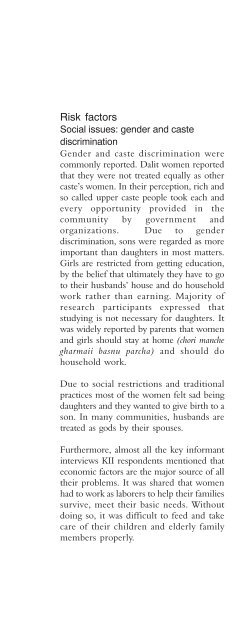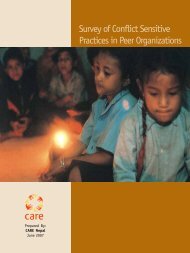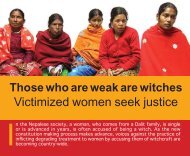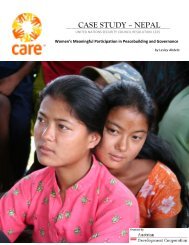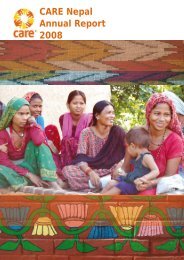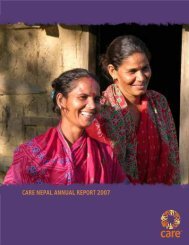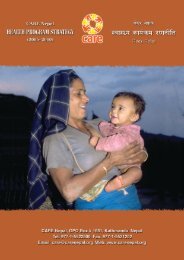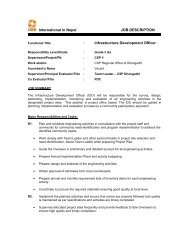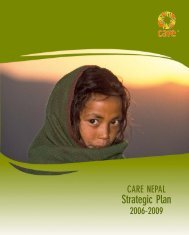Untitled - Care Nepal
Untitled - Care Nepal
Untitled - Care Nepal
You also want an ePaper? Increase the reach of your titles
YUMPU automatically turns print PDFs into web optimized ePapers that Google loves.
Risk factors<br />
Social issues: gender and caste<br />
discrimination<br />
Gender and caste discrimination were<br />
commonly reported. Dalit women reported<br />
that they were not treated equally as other<br />
caste’s women. In their perception, rich and<br />
so called upper caste people took each and<br />
every opportunity provided in the<br />
community by government and<br />
organizations. Due to gender<br />
discrimination, sons were regarded as more<br />
important than daughters in most matters.<br />
Girls are restricted from getting education,<br />
by the belief that ultimately they have to go<br />
to their husbands’ house and do household<br />
work rather than earning. Majority of<br />
research participants expressed that<br />
studying is not necessary for daughters. It<br />
was widely reported by parents that women<br />
and girls should stay at home (chori manche<br />
gharmaii basnu parcha) and should do<br />
household work.<br />
Due to social restrictions and traditional<br />
practices most of the women felt sad being<br />
daughters and they wanted to give birth to a<br />
son. In many communities, husbands are<br />
treated as gods by their spouses.<br />
Furthermore, almost all the key informant<br />
interviews KII respondents mentioned that<br />
economic factors are the major source of all<br />
their problems. It was shared that women<br />
had to work as laborers to help their families<br />
survive, meet their basic needs. Without<br />
doing so, it was difficult to feed and take<br />
care of their children and elderly family<br />
members properly.<br />
Protective factors<br />
Coping and resources<br />
A number of different coping strategies were<br />
identified. The coping mechanisms are<br />
divided into three categories: 1) individual<br />
coping (i.e. self-initiated strategies to solve<br />
a problem/situation, 2) family support (i.e.<br />
support or cooperation to solve a problem<br />
by family members), and 3) community<br />
support (i.e. support and cooperation from<br />
neighbors, elders and other community<br />
members to solve a problem/situation).<br />
It was revealed that most of the women first<br />
relied on their family members while<br />
experiencing problems. The family<br />
environment was found to be both a source<br />
of support as well as a source of increased<br />
distress. Some of them said they shared the<br />
problems with their family members<br />
especially with sons and daughters. Many<br />
also shared with close friends. A few of the<br />
respondents reported the use of alcohol to<br />
relieve their problems. Socially, women<br />
were supported by some organizations and<br />
emotionally by their close friends.<br />
Economically, women who had suffered<br />
from their in-laws and husband found<br />
support from their parental relatives (maiti).<br />
Furthermore, women were supported by<br />
their own children. Children helped their<br />
mothers to do household work and spent<br />
more time than before with them. On the<br />
other hand some of the women were beaten<br />
by their husbands, and were suspected of<br />
having relationships with other men, this<br />
blame towards the women increased their<br />
psychosocial problems.<br />
Psychosocial Issues of<br />
Women affected by conflict<br />
3


